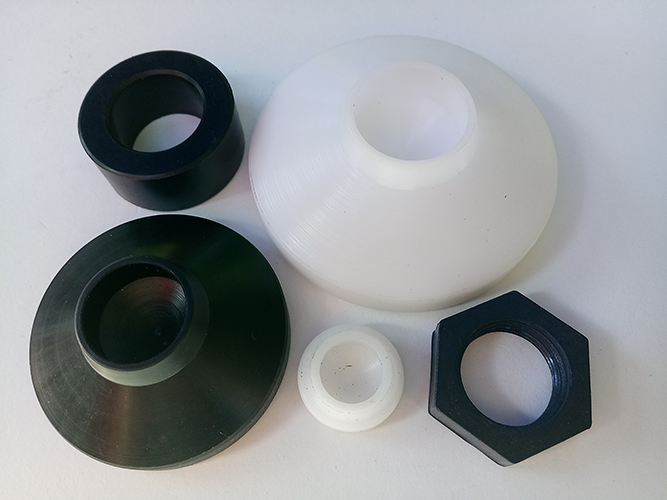| PLASTIC PRODUCTS | ||
|---|---|---|
| x | ||

Grizzley machines the following common grades of Plastics: Acetal (Delrin), ABS, Nylon,
Acrylic, Polycarbonate, Polysulfone, Ultem, HDPE, UHMW, PTFE, PET, PEEK, Torlon,
ECTFE, ETFE, PVC & FEP
Basics of Plastic Selection for Machining Machining of plastics can be advantageous for applications requiring low volume production, close tolerance dimensions and/or difficult to mold configurations. There is an array of plastics to choose from; highly engineered, high performance products to low cost, low performance. Determining which is appropriate for a particular application can be challenging. Typically an engineer will require 3 or less characteristics that are critical to the functionality of the component. A basic search will prioritize and look for a material that can supply all three. The below list presents only the most common machined plastics. Many plastics are available with fillers to enhance particular characteristics. For example, glass fill improves tensile strength while reducing machinability. Molybdenum disulphide improves wear while reducing dimensional stability. Clear Plastics: Stock shapes are typically clear but once machined they become translucent to opaque. Polishing is required to return the component to clear. Polishing methods are direct machine polish, vapor polish, flame polish, and buffing. Good Choices: Acrylic (clearest), Polycarbonate, Clear PVC, Polysulfone, Ultem Loading Strength (psi): Tensile strength (plastic in tension) and compression strength (plastic under compression) are important values for structural applications. Good Choices: Ultem, Peek, PPS, Nylon, Delrin Poor Choices: Teflon, UHMW, LDPE, HDPE, Polypropylene Temperature Resistance: Consider either continuous service temperature in air or heat deflection temperature if under load. Good Choices: PTFE, PEEK, Ultem, Torlon, PPS Poor Choices: Acrylic, UHMW, ABS, PVC Limiting PV: A combination of pressure and velocity that determines whether a plastic material has enough thermal and structural ability to withstand a bearing application in rotational wear. Good Choices: Peek, Nylatron, Delrin AF, Torlon 4301 Poor Choices: UHMW, PBT, PET Nylon Dimensional Stability: Machined plastics do not have the structural stability of metals. This is primarily caused by their tendency to absorb water and a high coefficient of thermal expansion. Stable materials have low water absorption with a low CTFE. Good Choices: Ultem, Peek, PPS, PET Poor Choices: Nylon, UHMW, HDPE, LDPE Chemical Resistance: Chemical resistance of plastics is variable. Some materials show an almost universal resistance to chemicals while others are very sensitive and stress crack when exposed. Best practice is to consult a reference guide for a specific chemical/plastic interaction. Good Choices: Teflon, UHMW, CTFE, PEEK Poor Choices: Acrylic, ABS, Noryl, Polysulfone Toughness/Impact resistance: A measurement of a plastics ability to withstand a sudden shock or a blow. Do not confuse this with resistance to steady state stress where failure can occur from chemical attack or configuration stress risers. Polycarbonate can tolerate high impact but stress cracks from steady loading. Good Choices: Nylon, Polycarbonate, UHMW, Peek Poor Choices: PET, Acrylic, Noryl, Polysulfone Cost: General measure of cost of the material. Higher performance engineered plastics are more expensive. Inexpensive Choices: Delrin, UHMW, Polypropylene, HDPE Expensive Choices: Peek, Vespel, PPS, Radel HDPE Biocompatible: Suitability for use in medical device applications. Plastics carry the USP class VI designation. Good Choices: Polycarbonate, Peek, UHMW, Radel FDA: The Food and Drug administrations classification for plastics which contact food. Good Choices: Delrin, PET, Polycarbonate, Peek Steam Sterilization: Same as autoclaving, a process where steam is used to sterilize plastics for medical device use. Good Choices: Radel, Ultem, Peek, Teflon UV Resistance: Resistance to UV typically seen in outdoor use. Plastics without resistance will age and embrittle. Because of the coloring, most black plastics have at least a small amount of resistance. Good Choices: Ultem, Polycarbonate (UV stabilized grade only, non FDA), PBT Poor Choices: Polycarbonate (FDA), Nylon, Acetal |
||

